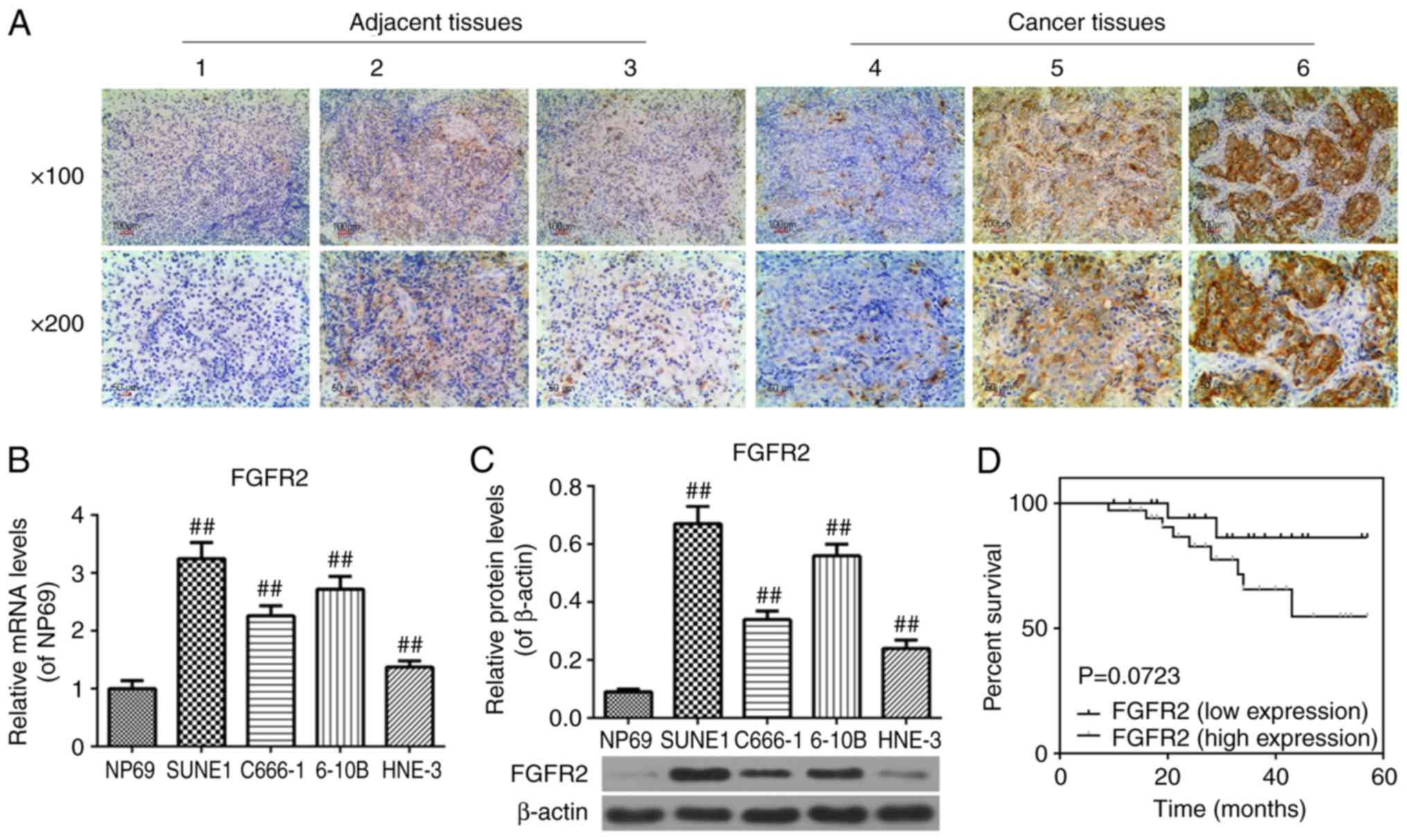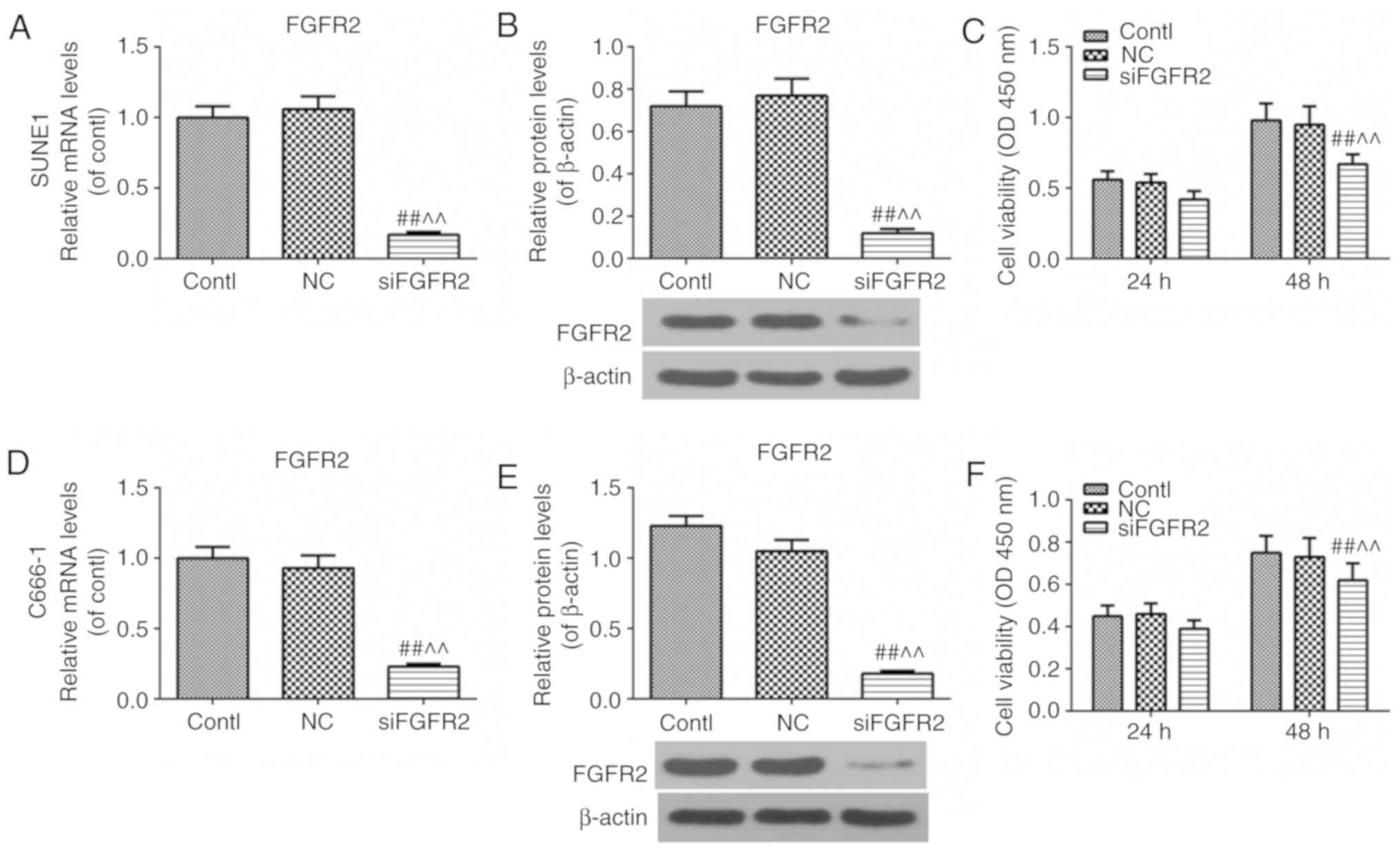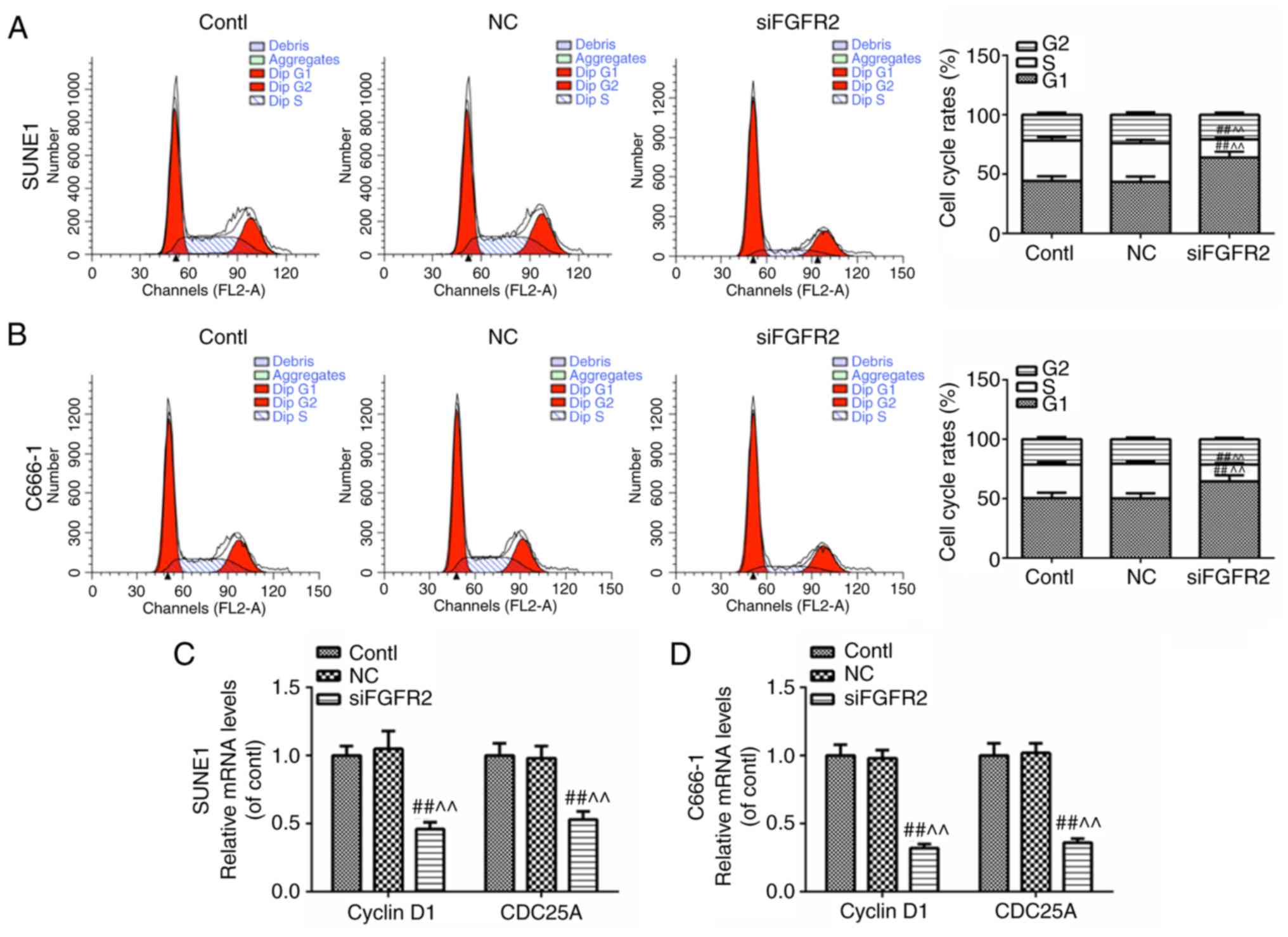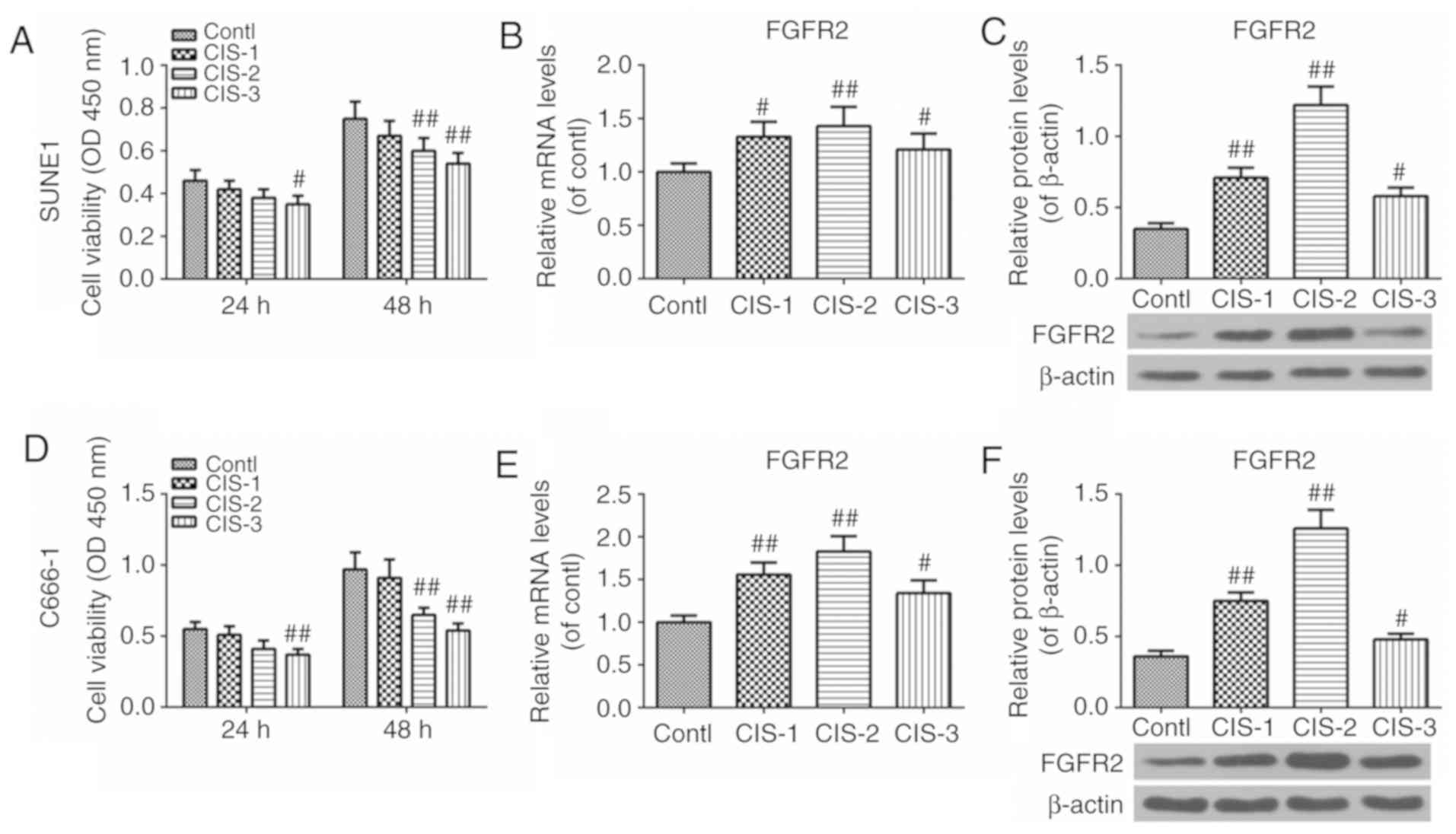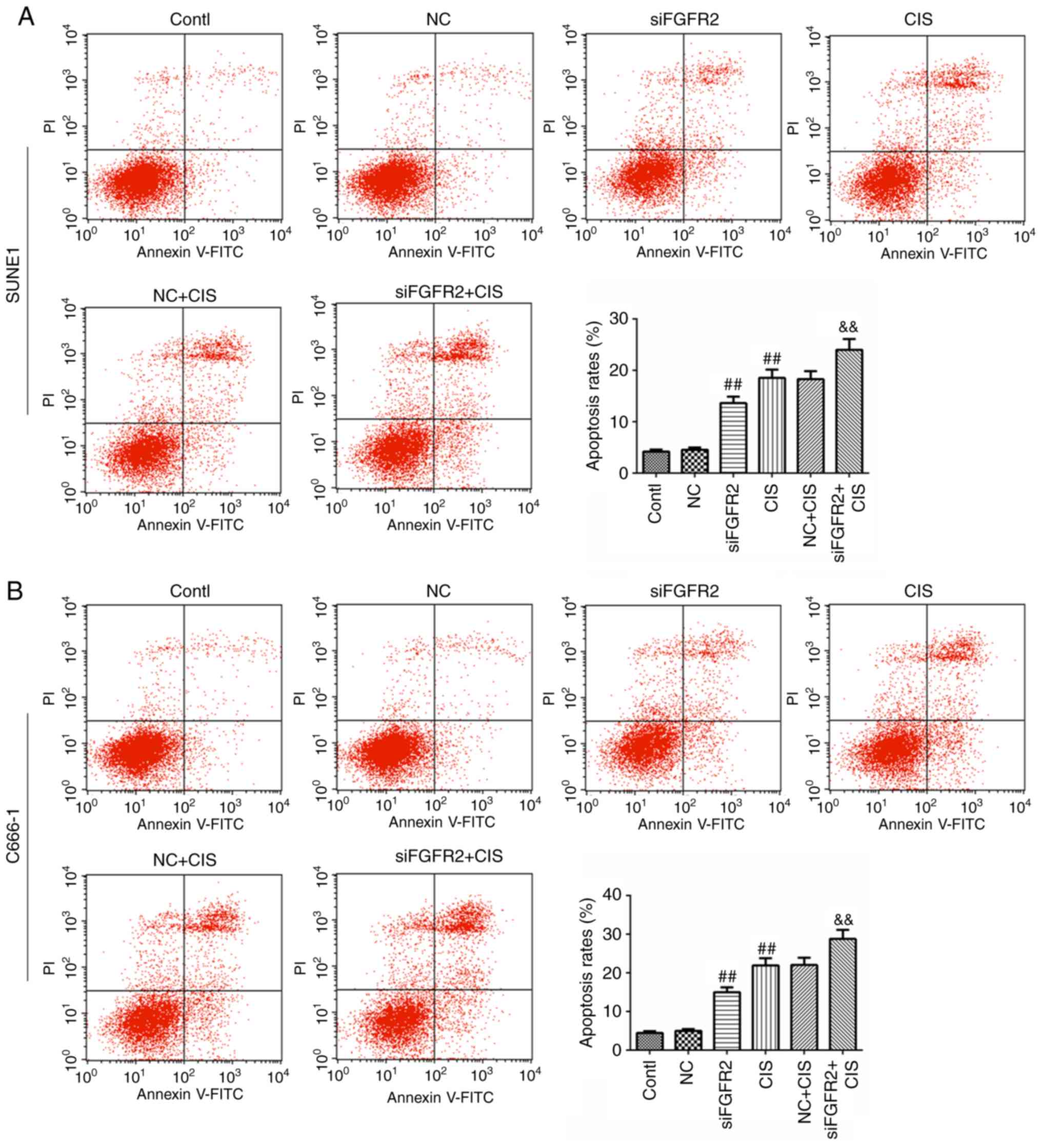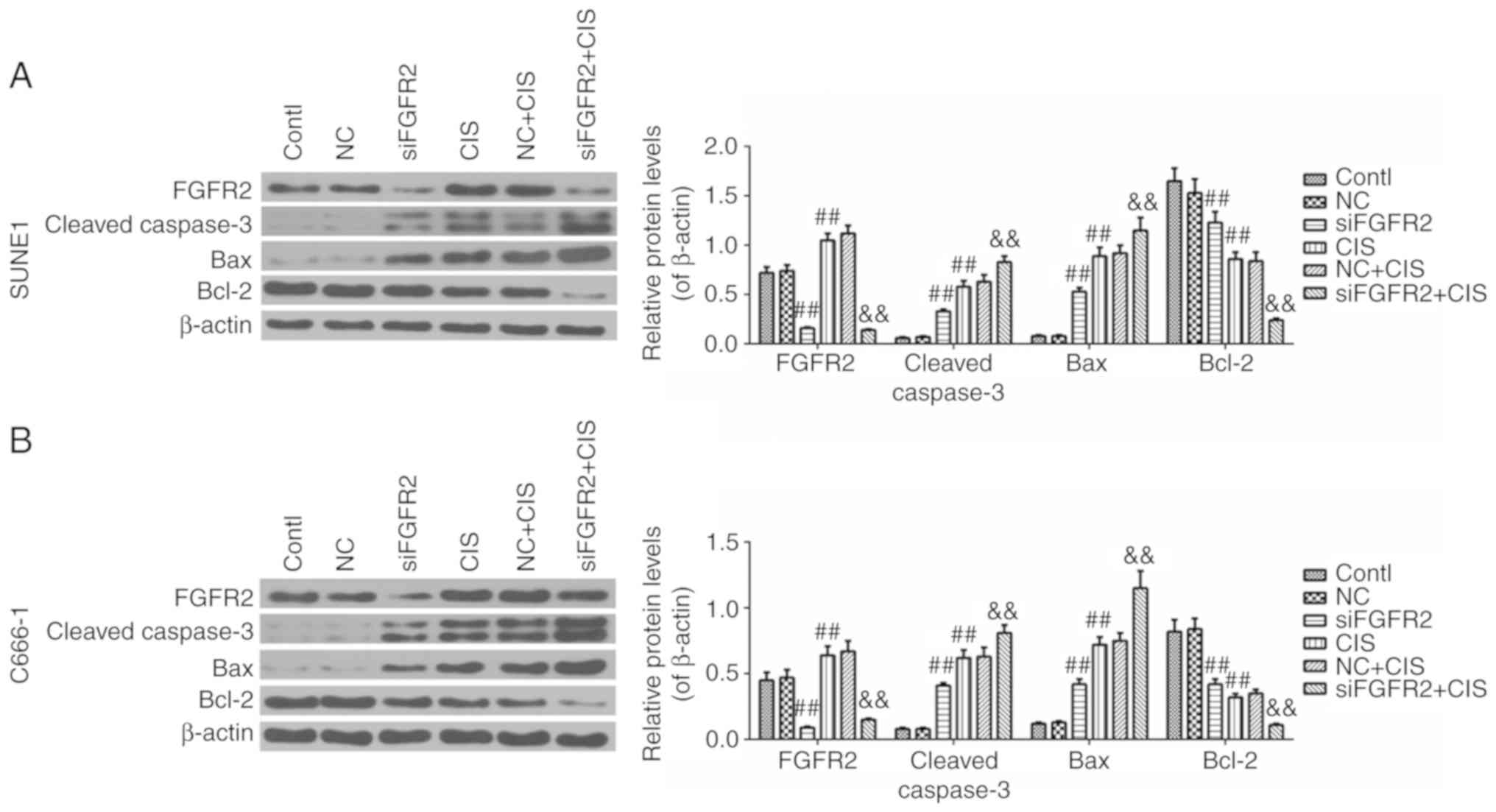|
1
|
Liu X, Tang LL, Du XJ, Li WF, Chen L, Zhou
GQ, Guo R, Liu Q, Sun Y and Ma J: Changes in disease failure risk
of nasopharyngeal carcinoma over time: Analysis of 749 p atients
with long-term follow-up. J Cancer. 8:455–459. 2017. View Article : Google Scholar :
|
|
2
|
Wilmot VV and Hathorn I: Surgical
management of nasal stenosis following chemoradiation for
nasopharyngeal carcinoma. J Laryngol Otol. 131:429–432. 2017.
View Article : Google Scholar : PubMed/NCBI
|
|
3
|
Strazzulla A, Barreca GS, Giancotti A,
Pisani V, Costa C, Zicca E, La Boria A, Roveda L, Liberto MC, Tucci
L, et al: Nasopharyngeal carcinoma: Review of the literature with a
focus on therapeutical implications. Infez Med. 23:224–229.
2015.PubMed/NCBI
|
|
4
|
Zhang X, Ibrahimi OA, Olsen SK, Umemori H,
Mohammadi M and Ornitz DM: Receptor specificity of the fibroblast
growth factor family. The complete mammalian FGF family. J Biol
Chem. 281:15694–15700. 2006. View Article : Google Scholar : PubMed/NCBI
|
|
5
|
Grose R and Dickson C: Fibroblast growth
factor signaling in tumorigenesis. Cytokine Growth Factor Rev.
16:179–186. 2005. View Article : Google Scholar : PubMed/NCBI
|
|
6
|
Katoh M and Katoh M: FGFR2 and WDR11 are
neighboring oncogene and tumor suppressor gene on human chromosome
10q26. Int J Oncol. 22:1155–1159. 2003.PubMed/NCBI
|
|
7
|
Turner N and Grose R: Fibroblast growth
factor signalling: From development to cancer. Nat Rev Cancer.
10:116–129. 2010. View
Article : Google Scholar : PubMed/NCBI
|
|
8
|
Jung EJ, Jung EJ, Min SY, Kim MA and Kim
WH: Fibroblast growth factor receptor 2 gene amplification status
and its clinicopathologic significance in gastric carcinoma. Hum
Pathol. 43:1559–1566. 2012. View Article : Google Scholar : PubMed/NCBI
|
|
9
|
Matsumoto K, Arao T, Hamaguchi T, Shimada
Y, Kato K, Oda I, Taniguchi H, Koizumi F, Yanagihara K, Sasaki H,
et al: FGFR2 gene amplification and clinicopathological features in
gastric cancer. Br J Cancer. 106:727–732. 2012. View Article : Google Scholar : PubMed/NCBI
|
|
10
|
Byron SA, Gartside MG, Wellens CL,
Goodfellow PJ, Birrer MJ, Campbell IG and Pollock PM: FGFR2
mutations are rare across histologic subtypes of ovarian cancer.
Gynecol Oncol. 117:125–129. 2010. View Article : Google Scholar : PubMed/NCBI
|
|
11
|
Riddell IA: Cisplatin and oxaliplatin: Our
current understanding of their actions. Met Ions Life Sci.
18:2018.PubMed/NCBI
|
|
12
|
Köberle B, Tomicic MT, Usanova S and Kaina
B: Cisplatin resistance: Preclinical findings and clinical
implications. Biochim Biophys Acta. 1806:172–182. 2010.PubMed/NCBI
|
|
13
|
Wu P, Tang Y, He J, Qi L, Jiang W and Zhao
S: ARC is highly expressed in nasopharyngeal carcinoma and confers
X-radiation and cisplatin resistance. Oncol Rep. 30:1807–1813.
2013. View Article : Google Scholar : PubMed/NCBI
|
|
14
|
Song Y, Zhou X, Bai W and Ma X: FBW7
increases drug sensitivity to cisplatin in human nasopharyngeal
carcinoma by downregulating the expression of multidrug
resistance-associated protein. Tumour Biol. 36:4197–4202. 2015.
View Article : Google Scholar : PubMed/NCBI
|
|
15
|
Edge SB and Compton CC: The American Joint
Committee on Cancer: The 7th edition of the AJCC cancer staging
manual and the future of TNM. Ann Surg Oncol. 17:1471–1474. 2010.
View Article : Google Scholar : PubMed/NCBI
|
|
16
|
Livak KJ and Schmittgen TD: Analysis of
relative gene expression data using real-time quantitative PCR and
the 2(-Delta Delta C(T)) method. Methods. 25:402–408. 2001.
View Article : Google Scholar
|
|
17
|
Zhang J, Upadhya D, Lu L and Reneker LW:
Fibroblast growth factor receptor 2 (FGFR2) is required for corneal
epithelial cell proliferation and differentiation during embryonic
development. PLoS One. 10:e01170892015. View Article : Google Scholar : PubMed/NCBI
|
|
18
|
Zhao X, Zhou Y, Chen YU and Yu F: miR-494
inhibits ovarian cancer cell proliferation and promotes apoptosis
by targeting FGFR2. Oncol Lett. 11:4245–4251. 2016. View Article : Google Scholar : PubMed/NCBI
|
|
19
|
Williams GH and Stoeber K: The cell cycle
and cancer. J Pathol. 226:352–364. 2012. View Article : Google Scholar
|
|
20
|
Feldt M, Bjarnadottir O, Kimbung S,
Jirström K, Bendahl PO, Veerla S, Grabau D, Hedenfalk I and
Borgquist S: Statin-induced anti-proliferative effects via cyclin
D1 and p27 in a window-of-opportunity breast cancer trial. J Transl
Med. 13:1332015. View Article : Google Scholar : PubMed/NCBI
|
|
21
|
Neumann J, Boerries M, Köhler R, Giaisi M,
Krammer PH, Busch H and Li-Weber M: The natural anticancer compound
rocaglamide selectively inhibits the G1-S-phase transition in
cancer cells through the ATM/ATR-mediated Chk1/2 cell cycle
checkpoints. Int J Cancer. 134:1991–2002. 2014. View Article : Google Scholar
|
|
22
|
Roque T, Haton C, Etienne O,
Chicheportiche A, Rousseau L, Martin L, Mouthon MA and Boussin FD:
Lack of a p21waf1/cip-dependent G1/S checkpoint in neural stem and
progenitor cells after DNA damage in vivo. Stem Cells. 30:537–547.
2012. View Article : Google Scholar :
|
|
23
|
Boutros R, Lobjois V and Ducommun B: CDC
25 p hosphatases in cancer cells: Key players? Good targets? Nat
Rev Cancer. 7:495–507. 2007. View
Article : Google Scholar : PubMed/NCBI
|
|
24
|
Shen T and Huang S: The role of Cdc25A in
the regulation of cell proliferation and apoptosis. Anticancer
Agents Med Chem. 12:631–639. 2012. View Article : Google Scholar : PubMed/NCBI
|
|
25
|
Kang T, Wei Y, Honaker Y, Yamaguchi H,
Appella E, Hung MC and Piwnica-Worms H: GSK-3 beta targets Cdc25A
for ubiquitin-mediated proteolysis, and GSK-3 beta inactivation
correlates with Cdc25A overproduction in human cancers. Cancer
Cell. 13:36–47. 2008. View Article : Google Scholar : PubMed/NCBI
|
|
26
|
Sur S and Agrawal DK: Phosphatases and
kinases regulating CDC25 activity in the cell cycle: Clinical
implications of CDC25 overexpression and potential treatment
strategies. Mol Cell Biochem. 416:33–46. 2016. View Article : Google Scholar : PubMed/NCBI
|
|
27
|
Lee KM, Santos-Ruiz L and Ferretti P: A
single-point mutation in FGFR2 affects cell cycle and Tgfbeta
signalling in osteoblasts. Biochim Biophys Acta. 1802:347–355.
2010. View Article : Google Scholar
|
|
28
|
Yin R, Bao W, Xing Y, Xi T and Gou S:
MiR-19b-1 inhibits angiogenesis by blocking cell cycle progression
of endothelial cells. Biochem Biophys Res Commun. 417:771–776.
2012. View Article : Google Scholar
|
|
29
|
Gredler ML, Seifert AW and Cohn MJ:
Tissue-specific roles of Fgfr2 in development of the external
genitalia. Development. 142:2203–2212. 2015. View Article : Google Scholar : PubMed/NCBI
|
|
30
|
Chen J, Liu S, Li Q and Peng J:
Combination of cytosine arabinoside and cisplatin enhances
inhibition of cell proliferation and promotes apoptosis of
resistant nasopharyngeal carcinoma cells. Xi Bao Yu Fen Zi Mian Yi
Xue Za Zhi. 31:379–382. 3862015.In Chinese.
|
|
31
|
Huang YY, Pu LJ, Song LL, Ma LY, Liu H and
Jiang CC: Knockdown of GRP78 enhances cell death by cisplatin and
radiotherapy in nasopharyngeal cells. Anticancer Drugs. 27:726–733.
2016. View Article : Google Scholar : PubMed/NCBI
|
|
32
|
Green DR and Llambi F: Cell death
signaling. Cold Spring Harb Perspect Biol. 7:2015. View Article : Google Scholar : PubMed/NCBI
|
|
33
|
Cole C, Lau S, Backen A, Clamp A, Rushton
G, Dive C, Hodgkinson C, McVey R, Kitchener H and Jayson GC:
Inhibition of FGFR2 and FGFR1 increases cisplatin sensitivity in
ovarian cancer. Cancer Biol Ther. 10:495–504. 2010. View Article : Google Scholar : PubMed/NCBI
|















